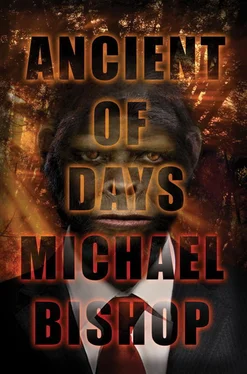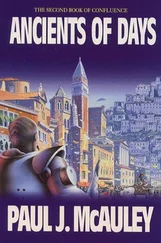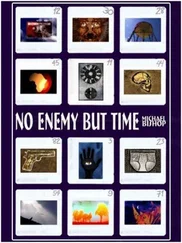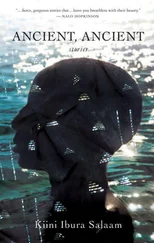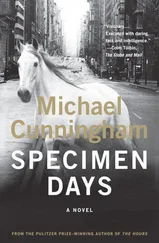“Listen, Loyd,” Nollinger retorted, “if he’d thrown up tonight’s dinner too, you’d still be faunching to get rid of him. I’m not the only victim of self-interest under the West Bank’s roof.”
“That’s what he was doing when I found him,” Zubowicz said.
“What are you talking about?” I asked the man.
“Adam,” Zubowicz said. “He was retchin’ into the toilet bowl. Tryin’ to, anyway. Couldn’t get much to come up.”
“Damn it!” I said. “That’s a lie!”
“You rub too much garlic and onion salt into your steaks,” Nollinger testified. “Garlic salt, onion salt, tenderizer—it’s just too much, Loyd.”
Adam bit off the thread caught in his fingernail and signed at RuthClaire.
“It was drinking the wine so fast that did it,” she interpreted. “The steak was prepared and cooked to perfection. He apologizes for the bad impression created by his lapses in table etiquette. He’s fine now.”
“That’s good,” Zubowicz said, “because the prof and I are gonna run him up to Atlanta for bookin’ and arraignment.” He gripped Adam by his hairy elbow.
RuthClaire said, “For being an illegal alien?”
“That’s what I’ve been tellin’ you.”
“What if he were an American citizen?”
Zubowicz smiled deferentially. “What if what?”
“He’s my husband, Mr. Zubowicz. A minister from Tocqueville—an ordained minister of the First United Coptic Church of Dixie—married us in a private ceremony at Paradise Farm over two months ago. We even had blood tests. It’s legal, I assure you. And we can prove it.”
“Jesus, RuthClaire,” I said, “you’re ten—fifteen—maybe twenty years older than he is!”
“That’s a threadbare old ploy,” Zubowicz said. “We’ve gotten really tough on folks who wed aliens just to confer American citizenship on them. It’s become something of an industry, and the penalties for taking part in these fake marriages—for devious or fraudulent purposes, Mrs. Loyd—well, nowadays the penalties are severe.”
“I’m carrying Adam’s child. How fraudulent or devious is that?”
I sat down at the table and exhaled a sigh as profoundly melancholy as I could make it. My ex had just given us offhand confirmation of everyone’s worst suspicions. But unless you insisted on seeing Adam as subhuman, underage, or mentally defective, you could not logically continue to upbraid her for “living in sin.” She was a married woman who had emphasized her bond to her new spouse by cooperating with him in the conception of a new living entity. Sadly, I preferred the living-in-sin hypothesis to so dramatic a demonstration of the lawfulness and incontrovertibility of their union.
Zubowicz turned to Nollinger. “Is it possible? Can a human woman and a, uh, well, a—?”
“Habiline male,” the anthropologist said.
“Yeah, what you said. Can they make a baby? Will the genes, uh, match up?”
“There’s precedent,” Nollinger said. “Of a sort. At Yerkes, not too long ago, a siamang and another kind of gibbon successfully mated when they were caged together for a long period. It surprised everyone, though.” He squinted at Adam. “Interbreeding between distinct human species—Cro-Magnon and Neanderthal, for instance—may’ve been one of the factors responsible for the wide variety among human physiques and faces today. Yeah,” he concluded, almost resentfully, “it’s possible, Mr. Zubowicz.”
I looked up. “RuthClaire, why didn’t you tell me?”
“I’d planned to, Paul. I just didn’t expect the evening to be abbreviated by a close encounter with a stooge from Immigration and Naturalization.”
“Mrs. Loyd,” said Zubowicz, wounded. “I’m only doin’—”
She cut him off: “Mrs. Montaraz, you mean. In private life, I’m now Mrs. Adam Montaraz. My professional name’s still RuthClaire Loyd—that’s what everyone knows my work by—but tonight, considering your mission, call me by my legal married name.”
Zubowicz threw up his hands and turned in an oafish half-circle to escape the fury in RuthClaire’s eyes. As he turned, a hard object shattered one of the windowpanes in my front door. It grazed Nollinger’s head and ricocheted off the metal divider between the dining room and the cash register. Nollinger dropped bleeding to his knees. Glass sparkled like costume glitter in the candlelight. A second missile—both were red-clay bricks, or brick fragments—burst through the picture window near us and toppled a potted geranium, a tall ceramic beer stein, and a fishbowl full of colored sand. Zubowicz had his pistol out again, but now he looped its barrel around urging everyone to retreat to the rear of the restaurant. Dazedly, even Nollinger complied, the gash on his temple leaking a crimson mucilage. Adam loaned Nollinger his shoulder as, bent over like a special services commando, I hustled RuthClaire to the back.
The squeal of an automobile laying down rubber reverberated from one end of Main Street to the other. A backward glance told me that the shadows in front of the Greyhound Depot Laundry had dispersed to their own secret corners of the night. Main Street was empty again, and no more bricks, I assumed, would come flying through my windows.
The vigilantes had had their fun.
“They’re gone,” I said, straightening up. “I think we’re okay. Damn it to hell, though. Look at this mess. Just look at it.”
“Insurance’ll pay for it,” a voice from behind me said. “Never knew a bigshot yet didn’t have him lots of insurance.”
Three people had entered the West Bank by the same route taken only a few minutes earlier by Dick Zubowicz. Two wielded shotguns. All three wore clothing that gave them the look of farmers in an outlandish variety of medieval clerical garb. Winged robes of shimmering lavender, with strange embroidered emblems and decorative piping of a much darker purple, fell just below the intruders’ knees, revealing jeans and scuffed work boots in two instances and pale hairy shins above powder-blue jogging shoes in the third. Pointed hoods—headpieces of grandiose, miter-like impracticality—concealed the men’s faces, but they had also pulled nylon stockings over their features to flatten and distort them. But one intruder had given himself away by speaking. And, by revealing his own identity, he had inadvertently divulged that of one of his seconds.
“Hello, E. L.,” I said. “Hello, Craig.”
Or maybe it had not been inadvertent. The robes, the nylon masks, the lopsided ecclesiastical headgear were more for show, for corny Grand Guignol effect, than for impenetrable disguise. That I could not puzzle out the name of the Ku Klutzer in jogging shoes—a lanky character who slouched along in a stoop—was an irrelevancy. What mattered was that three of my neighbors had worked themselves into a state of self-righteous agitation so calculating and cold that donning pompously comical costumes and trashing my four-star backwater cafe struck them as noble responses to something they just did not understand, or understood in the half-assed way of a house painter viewing Hieronymus Bosch. (Hell, I’m still not sure that I understand what they did or didn’t understand.) Now, dressed like pious executioners, they stood pointing shotguns.
Unignorable.
After taking Zubowicz’s pistol, the Klanners produced two pairs of handcuffs, one of which served to anchor the INS agent to the S-pipe under the sink in my kitchen, the other of which manacled Nollinger to the flocked divider in the dining room. The man in jogging shoes, who never spoke, took care of the handcuffing, and, as he worked, I could not help noticing sweat running down his legs to the tops of his shoes’ perforated ankle guards. The heat under those purple robes—I realized they were almost exactly the color of old Dr. Kearby’s beloved gentian violet—had to be strength-sappingly intense. What imbecility.
Читать дальше
